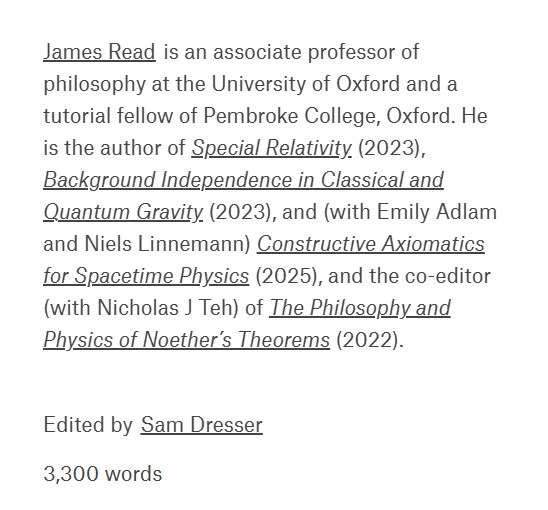Welcome to DU!
The truly grassroots left-of-center political community where regular people, not algorithms, drive the discussions and set the standards.
Join the community:
Create a free account
Support DU (and get rid of ads!):
Become a Star Member
Latest Breaking News
Editorials & Other Articles
General Discussion
The DU Lounge
All Forums
Issue Forums
Culture Forums
Alliance Forums
Region Forums
Support Forums
Help & Search
Why philosophy of physics?

Some physicists reject philosophy as a distraction from ‘real’ science but it is in fact both useful and beautiful
https://aeon.co/essays/why-do-philosophy-of-physics-when-you-can-do-physics-itself

Divine Comedy, Paradiso II (c1492-95) by Sandro Botticelli. Courtesy Staatliche Museen zu Berlin, Kupferstichkabinett/Philipp Allard

When I’m making small talk at parties and suchlike, revealing to others that I’m a philosopher of physics is a little bit like rolling the dice. What reaction am I going to get? The range is pretty broad, from ‘What does philosophy have to do with physics?’ to ‘Oh, that’s way above my pay grade!’ to (on happier occasions) ‘That sounds amazing, tell me more!’ to (on less happy occasions) ‘What a waste of taxpayer’s money! You should be doing engineering instead!’ Only the last of these responses is downright stupid, but otherwise the range of reactions is perfectly reasonable and understandable: philosophers of physics are, of course, not ten-a-penny, and what we’re up to is hardly obvious from the job description. So what I want to do here is sketch what the philosophy of physics really amounts to, the current state of play in the field, and how this state of play came about.
To cut to the chase: the philosophy of physics is the systematic study of our best theories of physics. This goes well beyond our current best candidates for fundamental theories of physics, such as string theory, and rather encompasses everything from Newtonian mechanics (which still constitutes the bread-and-butter of a great deal of practical physics, as well as perhaps the overwhelming majority of engineering), to Albert Einstein’s theories of relativity, to quantum mechanics, to the Standard Model of particle physics, to cosmology, and much else besides. And by ‘systematic study’ I mean something like asking questions such as these: ‘What is the conceptual and mathematical architecture of such-and-such a theory?’, ‘What would the world be like if such-and-such a theory were true?’, ‘What are the implications of such-and-such a theory for so-and-so areas of classical philosophical enquiry, like time, causality and identity?’
Given questions like these, one would be excused for thinking that the philosophy of physics is in fact continuous with physics ‘proper’ – and one would be quite right! Not only would trying to answer the above questions without a good working knowledge of physics be a forlorn hope, but also physicists themselves, especially theoretical physicists, often grapple with the structure of our best theories (for instance, there are a great many physicists working on the mathematics of general relativity, on the foundations of quantum mechanics, and so on). Ultimately, the difference between physics ‘proper’ and the philosophy of physics is really one of emphasis: philosophers are interested in understanding the structure and upshots for reality of the theories of physics that we already have, while physicists engage in the first-order practice of building new theories and then testing those theories experimentally.

Indeed, its ultimate emphasis on bettering our understanding of the theories of physics that we already have helps to make clear that the philosophy of physics really is a discipline in the arts – despite often requiring a good understanding of physics itself. As I see it, the philosophy of physics is in fact somewhat akin to art criticism – but where the subject matter is not music or visual art or architecture, but the theories of physics constructed by some of the greatest and most creative minds of all time (from Galileo to Newton to Einstein). Philosophers of physics all share the view that physical theories – these products of the highest level of human creativity – are just as worthy of aesthetic appreciation and critical study as anything else.
snip
1 replies
 = new reply since forum marked as read
Highlight:
NoneDon't highlight anything
5 newestHighlight 5 most recent replies
= new reply since forum marked as read
Highlight:
NoneDon't highlight anything
5 newestHighlight 5 most recent replies
Why philosophy of physics? (Original Post)
Celerity
Saturday
OP
cachukis
(3,274 posts)1. Early on, philosophers answered questions. Then
science took over.
I suggest we should inject our thinking with more philosophical analysis beyond the simple transaction.
Thanks for the post.